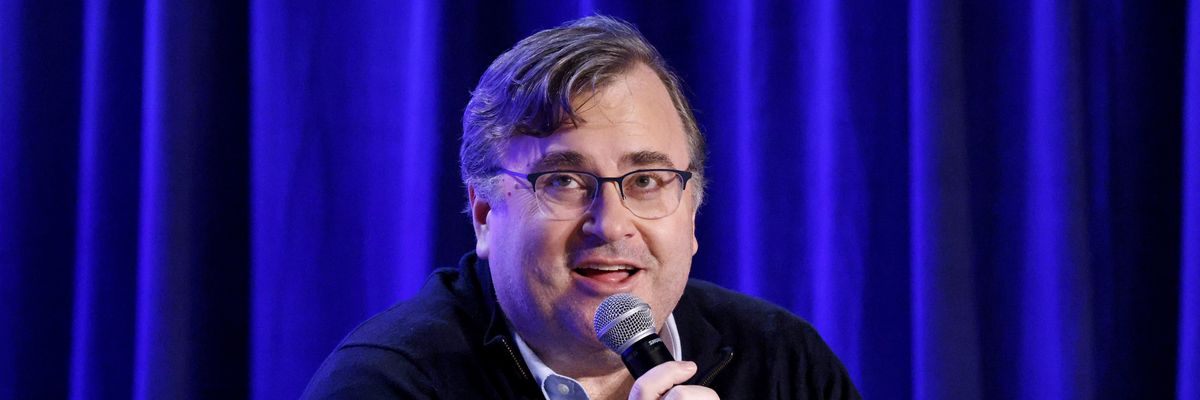The United States' "paper of record" gave ultra-rich investors and corporate executives a platform on Thursday to sound off against Vice President Kamala Harris' support for a tax on unrealized capital gains, a popular proposal that has stirred howls of complaint from Silicon Valley elites whom Harris used to represent in the Senate.
The New York Timesstory—headlined "Donors Quietly Push Harris to Drop Tax on Ultrawealthy"—quotes billionaire investor Mark Cuban; Aaron Levie, CEO of the cloud storage firm Box; Charles Myers, the founder of Signum Global Advisors; and others who have backed Harris' presidential bid.
"In my interactions with them, the key is she focuses on her values and is not an ideologue about any particular program," Cuban told the Times, which described him as one of the donors close to Harris who doesn't "believe she is that committed" to taxing billionaire wealth.
"From what I've been told," said Cuban, "everything is on the table, nothing's been decided yet."
Levie, who has donated $30,000 to Harris' campaign, said Silicon Valley leaders he has spoken with about the proposed tax on unrealized capital gains see the idea as "quite punitive."
"There's optimism that this can't possibly be real," said Levie. "Most people are waiting to hear from the Harris campaign. Is this a real proposal that is actually being pushed for—or was this something that was inherited from Biden?"
"The only thing at stake here is the remarkably fragile egos of billionaires who are on the verge of realizing they might not be saving civilization for anyone, including themselves."
The Times noted Friday that a group of wealthy Harris supporters known as "VCs for Kamala" found in a survey of its members that "roughly 75% of respondents agreed with the statement 'taxing unrealized capital gains will stifle innovation.'" The group includes billionaire LinkedIn founder Reid Hoffman and billionaire investor Chris Sacca.
The Patriotic Millionaires, a group of rich Americans who support higher taxes on the wealthy, issued a statement Friday criticizing both the "whining" megadonors and the Times for handing them a megaphone to attack efforts to rein in billionaire tax dodging.
"I'm shocked, shocked, I tell you that Wall Street billionaires and Silicon Valley tech bros are trying to convince a presidential candidate to abandon her commitment to tax them, and using their own alleged brilliance to justify it," said Morris Pearl, the chair of the Patriotic Millionaires. "I admire their chutzpah in claiming that taxing unrealized capital gains will stifle innovation!"
"Claiming that making a billionaire pay taxes on their second billion will reduce innovation is as absurd as the rooster claiming the sun won't rise without his crowing," Pearl added. "The billionaires I know were all highly motivated to earn their first billion. The only thing at stake here is the remarkably fragile egos of billionaires who are on the verge of realizing they might not be saving civilization for anyone, including themselves."
The Patriotic Millionaires also suggested some adjustments to the Times headline:
Some (Silly/Misinformed) Donors Quietly (although not actually all that quietly; it was reported on the front page of the NYT after all) Push Harris to Drop (Modest Compared to What it Should Be) Tax on Ultra-Wealthy While Other (Much More Sensible and, yes, More Patriotic) Donors Loudly Push Billionaires to Drop Opposition to Common Sense.
The Harris campaign has voiced support for the tax proposals outlined in President Joe Biden's most recent budget blueprint, including a tax on the unrealized capital gains accumulated by individuals with net worths exceeding $100 million—a portion of the nation's upper class that contains fewer than 11,000 people.
Under the nation's current tax structure, billionaires are able to dodge taxes by never or rarely selling stock positions, which are not taxed until they are "realized."
Gabriel Zucman, an economics professor at the University of California, Berkeley and a leading advocate of a tax on billionaire wealth, has applauded the Harris campaign for embracing the proposed levy on the unrealized capital gains of the ultra-wealthy.
In a May op-ed in the Times, Zucman noted that U.S. billionaires paid a lower effective tax rate than working-class Americans for the first time in the nation's history in 2018.
"The idea that billionaires should pay a minimum amount of income tax is not a radical idea," Zucman wrote at the time. "What is radical is continuing to allow the wealthiest people in the world to pay a smaller percentage in income tax than nearly everybody else."
"In liberal democracies, a wave of political sentiment is building, focused on rooting out the inequality that corrodes societies," the economist added. "A coordinated minimum tax on the superrich will not fix capitalism. But it is a necessary first step."

